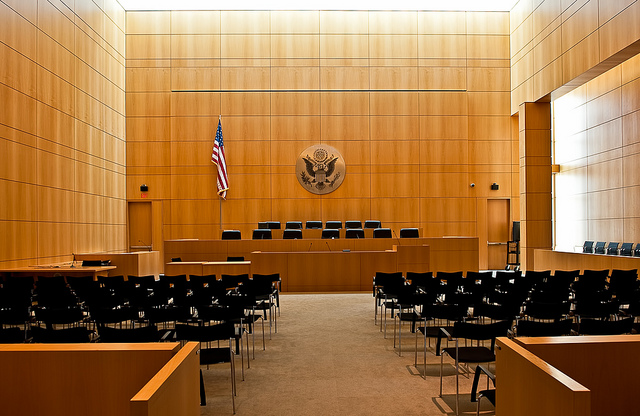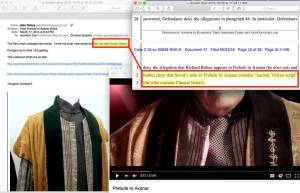Court Orders Peters Deposition, Other Plaintiff Requests
Table of Contents
Though he formally denied the plaintiffs’ emergency motion, federal magistrate Charles F. Eick nonetheless granted most of what CBS and Paramount wanted from Axanar, with discovery still due to end a few days hence.
UPDATE Alec Peters’ second deposition took place on November 2, 2016.
What CBS, Paramount Won
The order, issued October 31, 2016 without oral hearings, required:
- Axanar producer Alec Peters to submit to a second deposition.
- Making Axanar’s financial information available for non-lawyers in the case to see and comment upon.
- The defense to turn over a log of Peters’ communication with other lawyers prior to being served with the copyright infringement suit in December 2015.
Meanwhile, on the same day Eick issued his order, he led settlement talks between the studios, Peters and their attorneys.
DOWNLOAD the October 31 court order (PDF) issued by Magistrate Judge Charles Eick.
Partially Denied
While the order affirmed much of what the plaintiffs stated in their motion, the judge was unwilling to alter the case’s schedule, with the cut-off date for discovery looming on November 2, stating:
Notwithstanding the issues Plaintiffs have raised regarding the adequacy of Defendants’ document productions (based largely on information obtained in connection with the depositions taken in October of 2016), the Court will not require at this late date the effective recommencement of document searches, reviews and productions.1)
Axanar: Order is a 'Win'
Even so, Peters still considered the order a victory for the defense, tweeting:
![]() @StarTrekAxanar 10/31/16 12:51 pm
@StarTrekAxanar 10/31/16 12:51 pm
Axanar wins another small legal battle as CBS/Paramount ex parte motion is DENIED2)
Axanar’s Twitter account did not go on to specify what Peters won in the order.
Pyrrhic Victory
Peters claimed his victory on a bit of judicial parlance in the order that stated:
Except as expressly stated herein, the Application is denied.3)
However, as noted above, the judge’s ruling did grant the substance of what the plaintiffs sought.
Details of the Court Order
The emergency motion, submitted to the court on October 27, was prompted by the revelation of a trove of Peters’ emails that had not previously been disclosed to the plaintiffs, even after Peters’ October 19 deposition.
The emails came to light during the deposition of Prelude to Axanar director Christian Gossett, who resigned in May 2015, concerned about Peters’ spending and mismanagement of the Axanar feature.
Second Peters Deposition
In view of the undisclosed emails, the court granted the plaintiffs’ request to depose Peters a second time, something defense attorney Erin Ranahan initially opposed but then offered Peters for a two-hour deposition, with questions restricted to only the new materials.
The judge, however, ordered Peters to be deposed before the discovery cut-off for a maximum five-hour deposition. He also placed no limits on the topics beyond the usual limits in the federal rules for civil procedure.4)
Contradictions
The plaintiffs had complained that the emails that had previously been turned over included almost none between Peters and any of his creative team. Then Gossett handed them hundreds of pages of such emails, which chronicled how Peters committed the allegedly infringing acts.
At least one email pointed out what appeared to be inconsistencies between what Ranahan had claimed in earlier motions as defense against infringement and actions Peters actually took.
Releasing Axanar's Financials
CBS and Paramount had wanted to use a financial summary Peters claimed had been prepared by an accountant in depositions of other witnesses but the defense had marked it “attorneys’ eyes only.” Eick ruled that designation was improper:
The document (“Exhibit H”) appended to the [emergency motion] was not properly designated by Defendants as “Confidential – Attorneys’ Eyes Only.” … This document shall be treated as “Confidential.”5)
The order then made it possible for the plaintiffs to show the financial summary to a less restrictive list of qualified persons.
«That document may embarrass Mr. Peters by showing [how] he spent funds that were raised from Star Trek fans.» — CBS, Paramount Attorneys’ Ex Parte Motion
In her opposition brief, Ranahan told the judge the defense had submitted revised financial information on October 28, designated only “confidential” instead of “attorneys eyes only,” rendering moot the plaintiffs’ request in their emergency motion.6)
Embarrassing Information
Despite Peters’ recent public declarations the financials had been prepared by an accountant, the defense had marked the document “attorneys eyes only,” to protect Axanar’s trade secrets from competitors. She did not specify who those competitors were. She also claimed the financial information was not reviewed by an accountant and that it would be misused by Axanar detractors “seeking to bring down Alec.”7)
The plaintiffs said that was no basis for restricting access to the financials:
The only basis offered by Defendants’ counsel for the failure to de-designate this document is that is that the material in that document may embarrass Mr. Peters by showing the ways in which he spent funds that were raised from Star Trek fans. This is not a proper basis for designating a document as Highly Confidential.8)
Defense Objection
In her opposition to changing the confidentiality of the financial information, Ranahan essentially claimed opposing counsel couldn’t be trusted based on incidents in which she claimed the plaintiffs had breached confidentiality, including a supposed leak by the studios’ attorneys to AxaMonitor.
The judge was not persuaded by her argument.
Privilege Log
Upon learning from Peters in his deposition that he had sought legal counsel prior this lawsuit, studio attorneys asked for a log of privileged communications between Peters and other lawyers. The log is intended to give opposing counsel the chance to challenge whether any particular communication is protected by attorney-client confidentiality.
Eick substantially fulfilled the plaintiffs’ request, ordering the log to be provided before the discovery cut-off:
Squabbling Lawyers
Both the plaintiffs’ motion and defense’s opposition brief details back-and-forth disagreements between Ranahan and studio attorney David Grossman. Ranahan told the court studio lawyers had refused to have a meaningful discussion about privilege logs, including what they were specifically looking for, such as subjects, search terms, or types of attorney discussions the plaintiffs believed should be logged.
Discovery Disputes
Monday’s ruling was the latest in a series of disputes between the parties during the discovery process. Axanar had earlier won a motion to compel the plaintiffs to turn over records it had previously resisted. For its part, the defense gave up on its effort to dispute the studios’ actual ownership of Star Trek’s copyrights. 
Keywords




